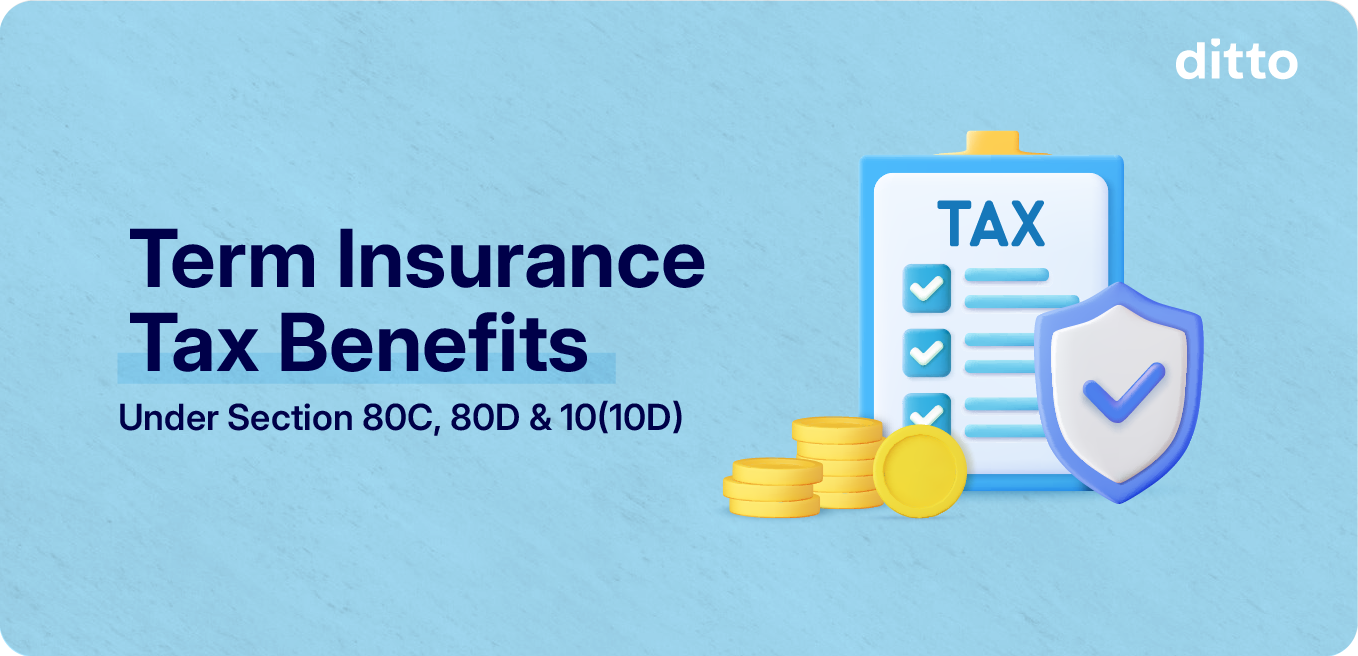Although term insurance is a protective tool rather than an investment, the Indian Income Tax Act, 1961 offers meaningful tax benefits for this protection.
If structured correctly, a term plan can:
- Reduce your taxable income every year
- Deliver a completely tax-free death benefit to your family
- Offer tax deductions on certain riders like critical illness within Section 80D limits
However, these benefits depend on which tax regime you choose, who the policy covers, and how the premium and riders are structured. Let’s break this down clearly.
About Term Insurance Tax Benefits
There are two major term insurance tax benefits in India:
- Tax deductions up to ₹1.5 Lakhs on premiums paid under Section 80C (Old Tax Regime)
- Tax-free payouts to nominees under Section 10 (10D), regardless of regimes.
In simple terms, term insurance helps you save tax while you’re alive and ensures your family doesn’t pay tax when they receive the claim amount.
Note: The government also removed GST on individual term insurance plans. You can check out our detailed guide on the same for more details.
Income Tax Deductions on Term Insurance Premium
Under Section 80C, premiums paid for a term insurance policy are eligible for a deduction of up to ₹1.5 lakh per financial year, subject to the overall 80C limits. This total deduction includes term insurance, EPF, PPF, ELSS, etc.
Who Can Claim This Deduction?
You can claim the deduction if you pay the premium for:
- Yourself
- Your spouse
- Your children (dependent or independent)
What Conditions Apply to Section 80C Deductions?
1) For life insurance policies, the Section 80C deduction is restricted if the premium exceeds:
- 20% of the actual capital sum assured for policies issued on or before 31 March 2012
- 10% of the actual capital sum assured for policies issued on or after 1 April 2012
- 15% (instead of 10%) if the policy is issued on/after 1 April 2013 and the insured is a person with disability/severe disability (80U) or has a specified disease (80DDB)
2) If the policy ends early or lapses, past tax deductions can be reversed. An early termination/lapse means the policy stops because premiums are not paid, and it is not revived. If this happens before 2 years of premiums are paid (different rules apply for single-premium policies):
- The tax deduction for that year may be disallowed.
- Any deductions claimed in earlier years can be added back to taxable income.
3) The deduction is only available under the old tax regime.
4) GST paid (before removal) on term insurance premiums is considered part of the premium amount and is therefore included within the Section 80C deduction limit.
Talk to an expert
today and
find
the right
insurance for you.

Term Insurance Tax Benefits Under Old vs New Tax Regime
In short, if you want premium tax savings, you must opt for the old regime. However, if you’re still confused or would like to decide for yourself which regime is better for you, you can check out this free tax calculator.
How The Tax Regime Affects Your Savings
Rohan pays ₹18,000 per year as premium for his term insurance policy and falls in the 30% income tax slab.
- Under the Old Tax Regime: The premium qualifies for deduction under Section 80C. This reduces Rohan’s tax liability by approximately ₹5,400 (30% of ₹18,000, excluding cess).
- Under the New Tax Regime: No deduction is available for term insurance premiums. Rohan gets zero tax savings, even though the policy remains active.
In short, if your goal is to save tax on term insurance premiums, opting for the old tax regime makes a clear difference.
Tax Benefits on Term Insurance Riders
Illness-based or health-related riders, such as Critical Illness, hospital care, and surgical care, are typically eligible for tax deduction under Section 80D (Old Regime). That said, term insurance offers a range of riders. Below, we break down the tax benefits of the ones we typically recommend at Ditto.
Critical Illness Rider
- Since the critical illness rider is an illness-based rider, the premium paid for it is typically eligible for deduction under Section 80D (old regime), subject to the applicable limits under that section.
- In addition, the lump-sum payout is generally tax-free.
Accidental Death or Disability Rider
- The premium paid for an accidental death or disability rider is also eligible for deduction under Section 80C, subject to the same overall limit.
- If a claim is made, the payout received due to accidental death or permanent disability is generally tax-exempt.
Waiver of Premium Rider
- The waiver-of-premium rider is considered a part of your base plan, and the premiums are deductible under Section 80C.
- If the rider is triggered, future premiums for the base policy (and attached riders, if applicable) are waived. This waiver itself does not have any tax implications, and any tax benefits already claimed on earlier premiums remain unaffected.
Important Note: The tax treatment of riders depends on how the insurer structures them. Always check whether the rider is bundled with the base policy.
Tax Benefits Under Sections 80C, 80D and 10(10D) With Respect to Term Insurance
Term insurance offers multiple tax benefits under the Income Tax Act, provided the policyholder opts for the old tax regime.
Tax Deduction on Premiums (Old Regime Only)
Section 80C
Premiums paid for the base term insurance plan are eligible for tax deduction under Section 80C, subject to the overall limit prescribed under this section.
Section 80D
Premiums paid for health-related riders, such as a critical illness rider, are eligible for tax deduction under Section 80D, as per applicable limits.
These deductions are available only if you file your taxes under the old tax regime.
Tax Treatment of Term Insurance Payouts – Section 10(10D)
Under Section 10(10D) of the Income Tax Act, the death benefit payout received by the nominee is completely tax-exempt, irrespective of the payout amount.
For example, whether the family receives ₹1 crore or ₹2 crore, the entire corpus received from the term insurance policy is exempt from income tax.
However, any interest, profit, or capital gains earned by the family after receiving the payout, such as through investments made using the proceeds, will be taxable as per applicable tax laws.
Documents Required to Claim Term Insurance Tax Benefits
To claim tax benefits, keep the following documents handy:
- Insurer’s name and policy number
- Policy document showing the sum assured and premium payment receipts
- Proof of payment (bank statement or transaction receipt)
- Death claim settlement statement (for nominees)
- PAN details of policyholder and nominee
For salaried individuals, submitting these to the employer helps in TDS adjustment. Otherwise, you can claim them directly while filing your ITR.
Steps to Claim Term Insurance Tax Benefits
Claiming tax benefits on term insurance premiums is simple, as long as you follow a few basic rules under the Income Tax Act.
1) Pay Premiums Through Proper Channels
The Income Tax Department does not require you to submit premium payment receipts while filing returns. However, it is important to ensure that all premium payments are made through proper, traceable online channels such as net banking, debit card, credit card, or UPI and keep proof of payment. You may need them if they weren’t already considered in Form 16 (or if you’re asked later during audit). Cash payments are usually not eligible for tax benefits.
2) File Taxes Under the Old Tax Regime
Tax benefits on term insurance premiums are available only if you opt for the old tax regime. These deductions cannot be claimed under the new tax regime.
3) Claim Deduction Under Section 80C
Term insurance premiums qualify for deduction under Section 80C, which allows a maximum deduction of ₹1.5 lakhs per financial year.
For example: If your gross taxable income is ₹10 lakhs per annum and you claim the full ₹1.5 lakhs deduction under Section 80C, your taxable income becomes:
₹10,00,000 – ₹1,50,000 = ₹8,50,000
4) Understand the Tax Savings
If you fall under the 30% tax bracket, a deduction of ₹1.5 lakhs can lead to tax savings of up to:
30% of ₹1,50,000 = ₹45,000 (excluding cess)
This means you effectively reduce your tax liability proportionately by claiming the deduction on your term insurance premium.
Common Mistakes While Claiming Term Insurance Tax Benefits
Why Choose Ditto for Term Insurance?
At Ditto, we’ve assisted over 8,00,000 customers with choosing the right insurance policy. Why customers like Aaron below love us:

- No-Spam & No Salesmen
- Rated 4.9/5 on Google Reviews by 15,000+ happy customers
- Backed by Zerodha
- 100% Free Consultation
You can book a FREE consultation. Slots are running out, so make sure you book a call or chat on WhatsApp now!
Conclusion
Term insurance is one of the rare financial tools in India that offers annual tax savings, zero tax on death payouts, and simple, predictable treatment under tax law
When chosen correctly, and under the right tax regime, it delivers both peace of mind and tax efficiency, without unnecessary complexity.
Full Disclosure: The information in this article is purely for educational purposes and should not be solely relied on for legal and financial decisions. Please consult a tax expert or CA for the latest guidelines.
Frequently Asked Questions
Why People Trust Ditto
Last updated on:




